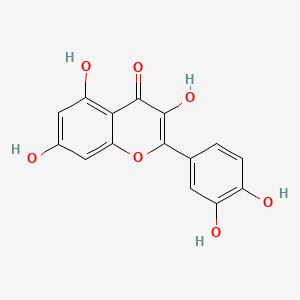quercetin
quercetin is a lipid of Polyketides (PK) class. Quercetin is associated with abnormalities such as Coronary heart disease, Myocardial Infarction, Cirrhosis, Coronary Arteriosclerosis and Vascular ring. The involved functions are known as Vasodilation, physiological aspects, Fermentation, Process and Ingredient. Quercetin often locates in Arterial system, Endothelium, Skin, Endothelium, Vascular and Tissue specimen. The associated genes with quercetin are P4HTM gene, SULT gene, UGT1A1 gene, ARHGAP26 gene and PLXNB1 gene. The related lipids are blood lipid, Promega, Steroids, Phosphatidylserines and Fatty Acids. The related experimental models are Knock-out, Mouse Model, Xenograft Model, Tissue Model and Cancer Model.
References related to experimental models published in Am. J. Physiol. Gastrointest. Liver Physiol.
| PMID | Journal | Published Date | Author | Title |
|---|---|---|---|---|
| 16455785 | Am. J. Physiol. Gastrointest. Liver Physiol. | 2006 | Mutch DM et al. | Hepatic cytochrome P-450 reductase-null mice show reduced transcriptional response to quercetin and reveal physiological homeostasis between jejunum and liver. |
